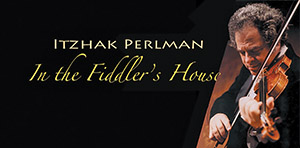
He has performed for kings, queens and presidents. Over the decades he has racked up Grammy awards, Emmys and countless international accolades. Twenty years ago, he had already earned honorary degrees from Harvard, Yale, Brandeis and Yeshiva Universities.
When you watch Itzhak Perlman joyously and furiously performing on his violin, you follow fancy notes hurtling through the air and allow yourself to be seduced by the romance of the moment.
A long, long time ago, we sat in his living room on the Upper West Side, and he was handed a children’s book called Fiddler to the World. He groans at the title. He’s never seen it before. “Does it say it’s an unauthorized biography?” he asked.
No, it didn’t: but the jacket mentioned that the book was written for children by Carol Behrman, a former school teacher from Fair Lawn, New Jersey, and that “from his birth to today he has worked tirelessly—but always with great joy—to make classical music as accessible as possible through concerts and recordings, or with Oscar the Grouch on Sesame Street.”
In a universe of giant egos, his warmth, modesty and candor were, and still are, refreshing, He said, “Anyone who believes his own press clippings and PR is in trouble. It’s not constructive. My job is to do the best I can. Sometimes I wonder if the reviewer and I were at the same concert—I prefer to keep probing, expanding and training, because it’s what I do with music that counts.”
The couch I was sitting on threatened to engulf me, so I settled myself on the floor, close to the coffee table, near my tape recorder and notebook. “So, shoot!” he commanded.
Did he ever get carried away, musically floating off into space? He accused me of being a romantic. I pled guilty and got a down-to-earth response. “It’s a combination of being very involved in the music and bringing it to the audience. I am aware when things are going well for me, when I’m enjoying myself, but I must keep my mind on what I do.”
When he was 5, Itzhak was given his first real violin and, shortly afterward, enrolled in the Tel Aviv Academy of Music. By age 9, he had developed “a good sound, a sound that would not want to make you throw things or run out of the house.”
Word spread about this talented kid and he began winning scholarships and the attention of Israel’s serious music teachers. Isaac Stem said that even at age 10, a Perlman performance was extraordinary. “It had a quality that demands you listen… it doesn’t ask permission.”
And then one day, just like in the movies, Itzhak Perlman was discovered by America when Ed Sullivan, the popular TV host who brought the Beatles to America, found himself in a Tel Aviv auditorium during an Itzhak Perlman performance. “I’ve got to have that kid on my show,” he told his wife. And he did.
Itzhak toured with The Ed Sullivan Cavalcade of Stars, an all-Israeli troupe that was co-sponsored by the Zionist Organization of America. After the tour was over, he and his mother waited in the U.S. for his father to sell his business and join them in New York. Itzhak supported his mother by playing the Jewish community dinner circuit. “The America-Israel Cultural Foundation gave us some money,” he recalls, “and I got a scholarship from Juilliard, but I earned our living by doing fundraising dinners for UJA, ZOA and Israel Bonds. The fees kept us going.”
Those dinners were his toughest audiences. “The events would take place in the old Statler Hilton or at the Waldorf-Astoria, and around midnight I would go out there and play ‘Flight of the Bumblebee’ or ‘Nigun’ by Ernest Bloch. I would be competing with audience fatigue, never mind my own fatigue. By that time, the audience would have had it; they’d be ready to go home. But it was a good experience, because later, when I started to play professionally, it was an easy transition for me. In fact, it was refreshing to appear in front of audiences that actually wanted to hear me perform.”
After wandering from dinner to dinner to please a tough Jewish crowd, one can’t help but ask, “What would be your definition of Yiddishkeit?”
“What is Yiddishkeit all about?” he avoids an answer, smiling.
“I often wonder what it means myself,” I respond.
Perlman laughed at that and then rubbed his hand across his forehead, from one side to the other. “Do you know what that means?” he asked. “Too bad we’re not on video. My hand is a wandering Jew, going from temple to temple.”
Then he said, “Yiddishkeit is all about helping the needy…whoever or wherever they are. An example of Yiddishkeit would be something that happened after an earthquake shook Egypt. A few hours after it hit, Israeli Prime Minister Yitzhak Rabin offered his government’s assistance to the victims. That is Yiddishkeit. Essentially,” he concluded, “Yiddishkeit means that we should make the world a better place.”
It’s a simple, straightforward message from an idealist who tries to do exactly that and never shied away from offering his opinions to American leaders in Congress. Through the universal language of music, Itzhak Perlman, in his own unique way, fulfills the commandment defined by his “Yiddishkeit.” And on March 31, at Carnegie Hall, he will be giving his precious time and talent to the National Yiddish Theatre-Folksbiene, bringing Yiddish music and the Yiddishkeit that fuels it, to life—for an audience eager to ride his music into the spirit of the past and the future.










